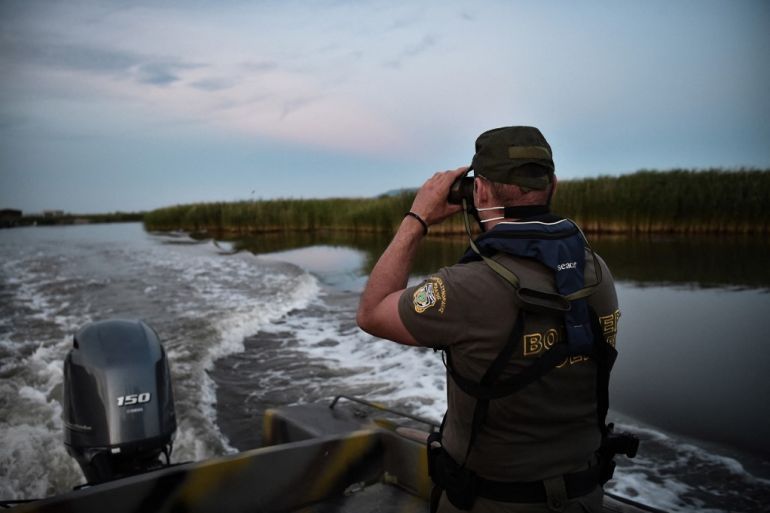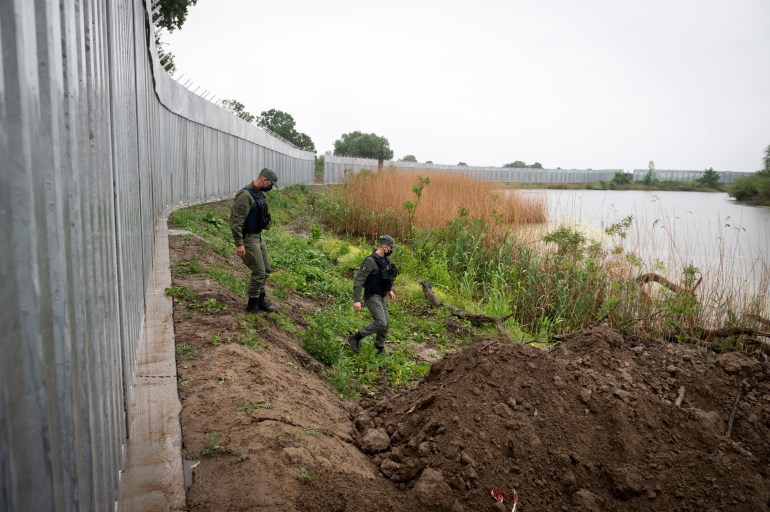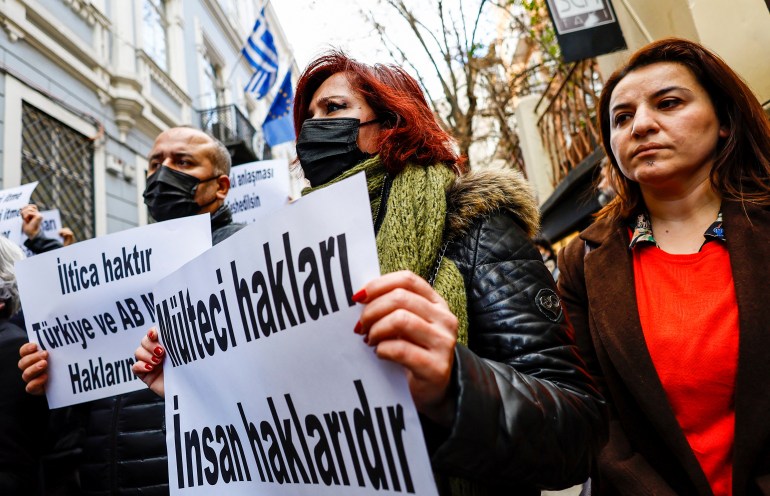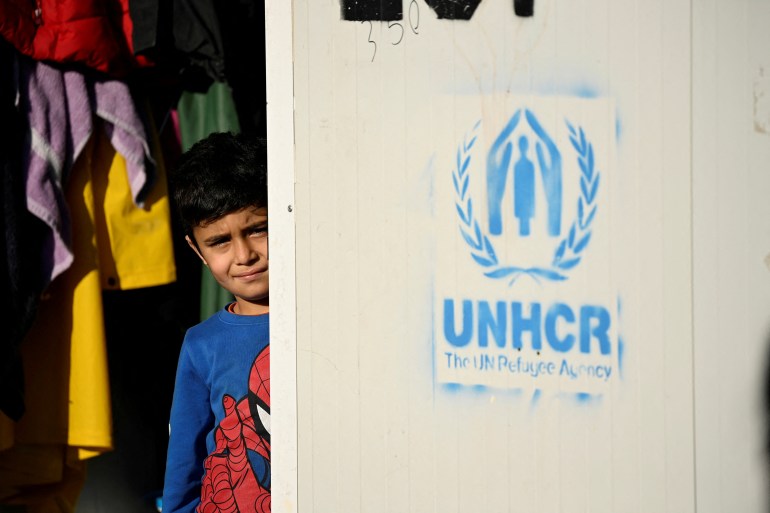Lawlessness at the border mars Greece’s reputation over migration
A new lawsuit filed in international court could prove that Greece has systematically pushed asylum seekers away for the past two years.

Athens, Greece – Greece has rejected Turkish accusations that its border guards stripped and summarily expelled 12 asylum seekers who later froze to death near its border.
“It is Turkey’s responsibility to prevent illegal departures,” said Notis Mitarakis, Greece’s migration minister, referring to a 2016 agreement between Turkey and the European Union.
Keep reading
list of 3 itemsCroatia, Greece, Romania illegally pushing refugees back: Report
Prisons in paradise: Refugees detentions in Greece raise alarm
The lawsuit of an expelled Iranian woman, filed in international court this week, could prove that Greece has systematically pushed asylum seekers away for the past two years.
The lawsuit filed on Tuesday at the United Nations Human Rights Committee accuses Greece of summary expulsion and refoulment – the exposure of an asylum seeker to danger and possible death, a crime under the Geneva Convention of 1951.
“I was pushed back from Greece six times,” said the claimant, Parvin, a trained psychologist, in a videotaped statement released by the Berlin office of the European Center for Constitutional and Human Rights (ECCHR), the legal aid group handling her case.
“A Greek officer arrested me and put me in a dirty cell, in cargo containers, packing us in with no air. Nothing to eat. No toilet. They beat me, kids, and also [a] pregnant woman. They took our cellphone, also our food and clothes. I was handcuffed, beaten, shot at, teargassed, tortured and nearly killed,” she said.

What makes Parvin’s case important is that during her first two attempts to cross the border from Turkey to Greece, in February 2020, she managed to keep her mobile phone, and kept video and GPS locations.
The data, included in her lawsuit, have been processed by Forensic Architecture, a research agency based at Goldsmiths, University of London.
They reveal that Parvin crossed into Greek territory and was held at Neo Heimonio, Iasmos and Soufli police stations, in each of which she filmed her holding cell.
At no location was she processed for deportation, which would have entailed an opportunity to apply for asylum.
At Neo Heimonio, she said she was tied to a chair and tortured, and her life was threatened.
In a chilling echo of the stripping of the dozen asylum seekers, she said her jacket was never returned to her, and the men expelled with her were left with T-shirts in 4C (39F) weather.
“What’s become very clear is that the Greek government has created black sites, has created a zone of lawlessness along the border. That’s wholly unacceptable,” Pavlos Eleftheriadis, professor of public law at the University of Oxford, told Al Jazeera.
“I want to tell my story because I want justice. I want my human rights to be recognised and I want this system to change,” Parvin said.
Greek policy turnaround
Parvin’s lawsuit is the latest in a string of lawsuits against Greece for summary expulsions.
No fewer than 32 others were filed last year with the European Court of Human Rights at Strasbourg, which communicated them to Greece on December 2.
Panayotis Dimitras, head of the Greek Helsinki Monitor, which litigates against human and minority rights violations, said such a large batch of ECHR cases on the same broad topic has never happened before.
“The government has been claiming all around that anyone who says that there are illegal pushbacks is a liar, is an agent of Turkey or is propagating Turkish propaganda,” Dimitras told Al Jazeera. “Is the [European] court propagating Turkish propaganda?”

Also new is the cruel and degrading treatment of the plaintiffs on Greek soil.
“We claim that this extent of torture, etc, is unprecedented. Not even during the junta did we have so many cases,” said Dimitras, referring to the seven-year colonels’ dictatorship that ruled Greece until 1974.
Before and after the dictatorship, however, Greece kept a high profile on human rights.
It was a founding signatory to the Geneva Convention on the Status of Refugees in 1951, under which it is now being prosecuted.
It used to be a tenet of Greek foreign policy to highlight Turkey’s detentions of journalists, politicians and activists.
But Greece began to break with that policy in 2017, when it blocked a European Union statement at the United Nations criticising China’s human rights record.
The previous year, China had bought a 35-year lease of the Greek port of Piraeus, and had become one of the country’s biggest investors.
Respect to China
Asked about the change in policy at the time, then-Foreign Minister Nikos Kotzias told Al Jazeera: “I respect that the Chinese have a different opinion on human rights.”
What worries human rights advocates is that the increased scale of pushbacks suggests they have become government policy.
“If you look back in time, it was primarily the coast guard and border guards who engaged in pushbacks; but we saw in Parvin’s case that she was detained 200km [124 miles] inland,” said Nils Muiznieks, former European human rights commissioner and now European regional director for Amnesty International.
“In Amnesty’s own work, we’ve seen expulsion from deep within Greek territory … so it’s not just people at the border, it’s law enforcement more broadly with political cover. It’s not rogue actors but it’s become a system … it’s become policy in fact, but not in name, and not acknowledged,” he told Al Jazeera.
Parvin’s description supported this impression of collusion across state services.
She reported that army commandos in black balaclavas were involved in the final stage of expulsion across the Evros river, which forms the border with Turkey.
Aid groups such as Aegean Boat Report and Legal Centre Lesvos have recorded dozens of similar observations during pushbacks at sea.
No Greek investigations
The Greek Helsinki monitor said that during the past three years, it has sent more than 200 cases of summary expulsion, including torture, rape and robbery, to 20 Greek prosecutors, to the National Agency for Transparency and to the Greek Ombudsman.
None has resulted in a prosecution.
“I am shocked that the Greek courts are not investigating,” said Eleftheriadis. “The Greek courts, if they are independent, have to risk becoming unpleasant to the Greek government.”
“We don’t expect anything from prosecutors,” said Dimitras. “Who promotes the prosecutor from the court of first instance to appeals, and from appeals to the supreme court? The government.”
Reputational risk
Ignoring the problem internally risks reputational damage and exposure internationally, said Eleftheriadis.
“The consequences for the reputation of Greece … are already happening,” he told Al Jazeera. “All journalists who write about these matters in the international press take the same view – they accept that pushbacks are routine, and they accept that Greece is not a place where the rule of law is respected.”
He also said the issue did not get attention in the Greek press, “but everyone can make the connection”.
“If you don’t respect the rule of law in one area, especially an area where you might get political benefit, you might not respect the law somewhere else, too,” he said. “It’s not something you can carefully isolate. In terms of … creating a hospitable environment for foreign direct investment, I’m sure it’s going to reflect very badly on the standing of Greece.”
The centre-right New Democracy government, in power since 2019, has made the pursuit of multinational investors a signature policy.
Its successful courtship of companies like Microsoft, Amazon, Volkswagen and Citroën has been broadly publicised.
Yet, Greece continues to rank poorly among developed economies in transparency and rule of law evaluations.
A European problem
Parvin claimed to have heard English, French and possibly German during her numerous detentions, raising questions about the possible collusion of European forces during illegal Greek expulsions.
During the crisis of March 2020, when Turkey encouraged refugees to storm Greek borders, Austria, Poland and other EU members sent elite police units to the Greek border. And lawsuits for pushbacks have been brought against other EU frontier states.
Last year, the Greek Helsinki Monitor joined a group of aid organisations to file a lawsuit against the European Border and Coast Guard (Frontex) for failing to prevent crimes it witnesses.
In December 2020, members of the European Parliament called on Frontex chief Fabier Leggeri to resign on suspicion that his agency had turned a blind eye to pushbacks.
A European parliamentary committee investigation concluded last July that collusion could not be proven.
Apart from possible criminal collusion at the border, there is a policy vacuum in the EU that leaves Greece very much alone to face flows of refugees and asylum seekers that the Greek economy has difficulty absorbing.

Under EU rules, asylum seekers must apply at the first EU member in which they arrived.
In the first nine months of last year, Greece registered 4.8 percent of EU asylum applications, although it is home to 2.4 percent of the EU population and its per capita GDP is among the EU’s five lowest.
Greece and other external border countries have called for a solidarity mechanism that shares the burden of asylum applications with other EU states. More than a year of discussion has not led to agreement.
A security issue
EU attitudes towards migration were hardened when Turkey and Belarus encouraged refugees to storm European borders in March 2020 and last year, in an attempt to put pressure on the bloc.
These two incidents have helped turn a humanitarian crisis into a security issue.
Al Jazeera has learned that further lawsuits against Greece are in the works.
For the moment, there is no official reaction from the government on how they will be rebutted.